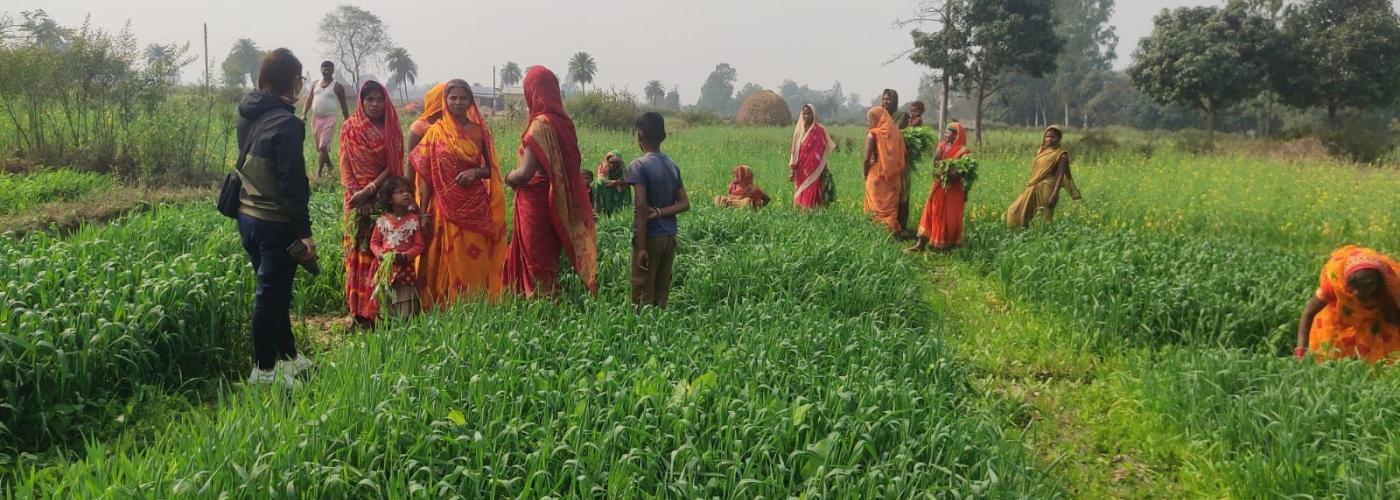Filling the Gap between Seeds Research and Small-Scale Farmers
Image

CARE’s Farmer Field and Business School (FFBS) model focuses on improving small-scale farmers’ productivity, resilience, and access to markets. FFBS is a hands-on, learning-by-doing approach through which groups of farmers meet regularly during the course of their value chain production cycle to learn about new agricultural techniques and to experiment these treatments on group-managed demonstration plots. Since 2014, FFBS has directly improved the lives of more than 2.5 million farmers and their families.
In Nepal, under CARE’s new Scaling FFBS Program, farmers have had the opportunity to lead both seed selection and evaluation in their selected value chain. The wheat value chain was selected by 150 farmer groups of over 3,000 members, 70 percent of them women. Wheat is the second major cereal crop in the Sapatari and Siraha districts of the Madhesh province, where this program is being implemented.
The farmers of this program identified the use of old wheat varieties, coupled with the absence of high-quality seeds, resulting in low farming yields. Using higher quality and improved seeds increases yield by 20-25 percent alone. Typically within Nepal, the Nepal Agriculture Research Council (NARC) serves as a research wing of the government to generate various varieties and breeds of seeds after they pass through its rigorous process of varietal selection. These varieties are developed considering various yield attributes and adaptability factors in different agroecological zones. However, these development processes are mostly completed within research stations, which does not include the farmers' active, very limited participation. This often results in a lack of adaptability in farmers’ plots when they are not allowed the option of choosing the best varietal among those available. This process is mostly determined by the “what” of which variety should be planted without considering the “who” of the farmers who are actually carrying out the production cycle themselves.
In response to this, farmers working with CARE Nepal choose a participatory varietal selection (PVS) process as a priority for their demonstration block. As the end-users of agricultural technologies, farmer groups led the overall PVS process themselves. The Nepal FFBS team assisted in mapping out existing wheat seed varieties in the country and picked six varieties that have been identified as resistant to drought and rust, high yielding, and rich in zinc. Mainly in the demonstration plots, the 150 farmer groups in different FFBS locations will evaluate the varieties based on yield and adaptability. They will also receive technical training to enhance their production skills and capacities. Currently, the crops are in the field stage, and the final participatory evaluation will be done in April 2023 at the crop harvesting stage.
Through PVS, farmer groups increased their access to improved seed sources, tested crop varieties in their context, and identified the best-adapted varieties. The process minimized the risk of failure and increased productivity. Farmers, with the support of capacity-strengthening through the FFBS program, are well-versed in the yield attributes of crops and can use the same approach in other crop supply chains in the future. Additionally, government research and development organizations receive feedback that allows them to improve their programming. Eventually, the selected best varieties will be put on for seed multiplication in the same locality through next year. The large number of smallholder farmers who currently have no access to improved seed varieties will then get locally produced and improved seeds that will help maximize their production and return.
Already, this method shows the opportunity to use FFBS as a platform to connect and fill the gap between improved seed research from public institutions and farmers at the small-scale level for improved productivity across the board. Further data on the result of PVS will be released after the evaluation process has been completed.

